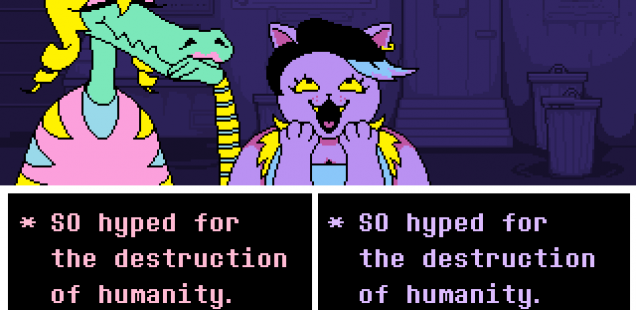
2015: The Year of Bullet Hell
We’re bobbing and weaving today with Undertale, Dungeon Souls, Nuclear Throne, Assault Android Cactus, and The Binding of Isaac: Afterbirth.
Undertale
The tagline for Undertale is “The RPG where you don’t have to destroy anyone”. Most writing about the game chooses to interpret this as a moral challenge to the player, a schoolmarmish shaking of the head at the very idea of violence in videogames, but that’s a surface reading, at best. It fails to account for the cracks and crevices in a game which is worryingly, doggedly clever. What Undertale actually does is to give you the option: it adapts to your style of play, and provides an experience which is calculated to be particularly satisfying for you depending on your intent.
If you go into the game prepared to destroy everyone, you are rewarded with a horror game where you play and ultimately triumph as the villain. If you go in as a pacifist, the game rewards you with difficulty and mechanical resistance to your selflessness that gives your martyrdom meaning, coupled with sneaky structural pitfalls designed to test the limits of your virtue. If you arrive ready to make fun of the whole experience, the game is prepared for that, too. My favorite joke in a spectacularly joke-dense narrative is a sign which says “press Z to read signs.”
Undertale is an extraordinary piece of work because there are so many ways to experience its deceptively brief runtime. This is a game that was loved and labored-over, and each layer that peels back before the inquisitive player reveals another, denser, more troubling read. The best joke in it may ultimately be that a game with an overt contempt for completionism hides massive rewards for those willing to stop and experience every little thing.
Isaac Hoffer can be found on the internet. Things he does include the existential Let’s Play series Despair Mode and falling-asleep-in-the-back-of-your-parents’-car sim Talk Simulator 2.
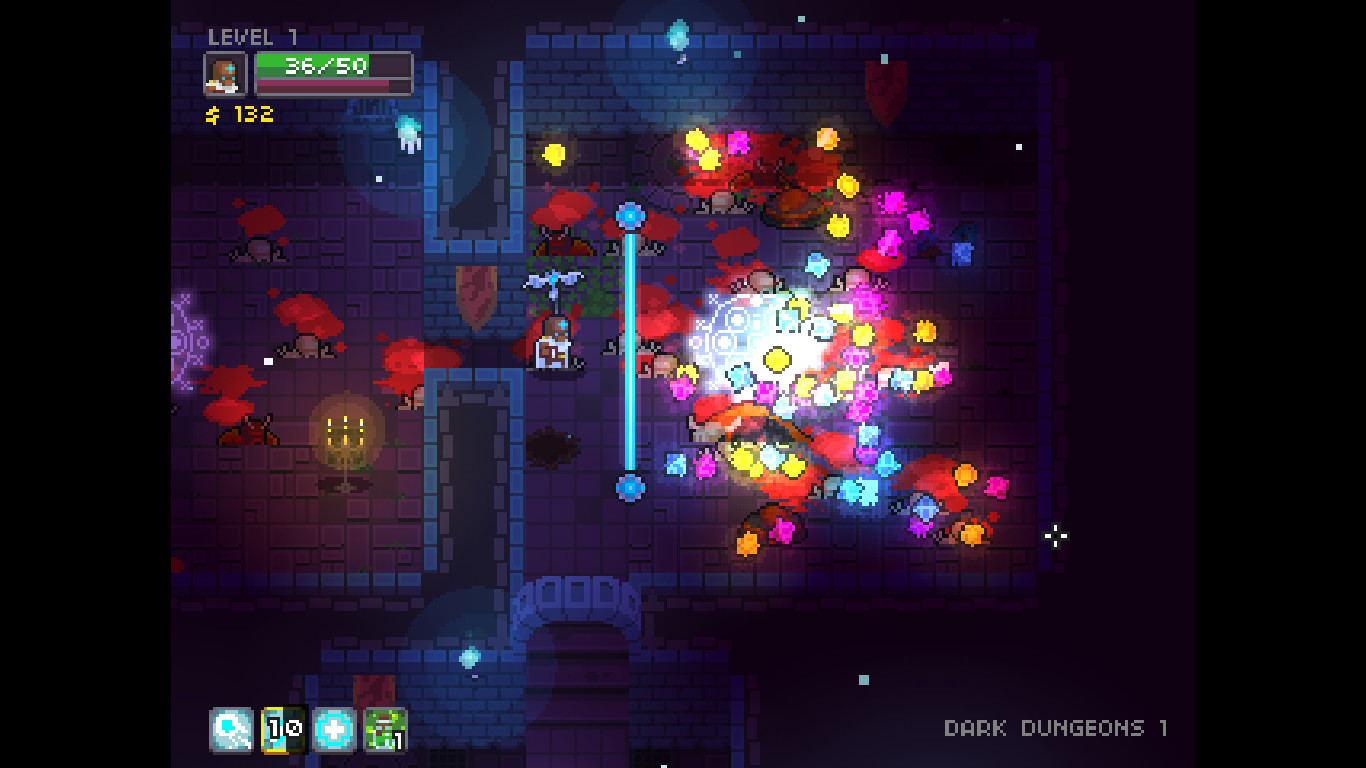
Dungeon Souls
Dungeon Souls is one of those Early Access games that doesn’t really seem like an Early Access game. It feels like a complete and very playable game with the developer promising more characters, levels, and features. You would be hard pressed to find any part of the experience that appears incomplete.
Mashing up aspects of some of the best in the genre, Dungeon Souls is another entry in the recent proliferation of roguelikes. The collectible power-ups are similar to Risk of Rain, where items are randomized and give permanent abilities. All of the status effects stack upon each other and, with a little luck, certain combinations can be quite satisfying and effective. Dungeons Souls, like Nuclear Throne and Overture, has a robust roster of characters with different abilities and traits that really change up the player’s approach to the hordes of enemies.
Aside from the solid roguelike elements, Dungeon Souls has some of the best pixel graphics from the past year. While retro art is commonplace in modern gaming, the game manages to have its own particular style, especially with some of the larger boss characters that dominate the screen. The game is gorgeous.
Dungeon Souls isn’t the most original game being developed, but it is an immensely replayable roguelike that is unforgiving, robust, and fun.
Dan Paredes is a writer for uniquedrops.com and co-founder of the Infinite Lives Podcast. The first game he ever played was the classic Apple II game, Bruce Lee.
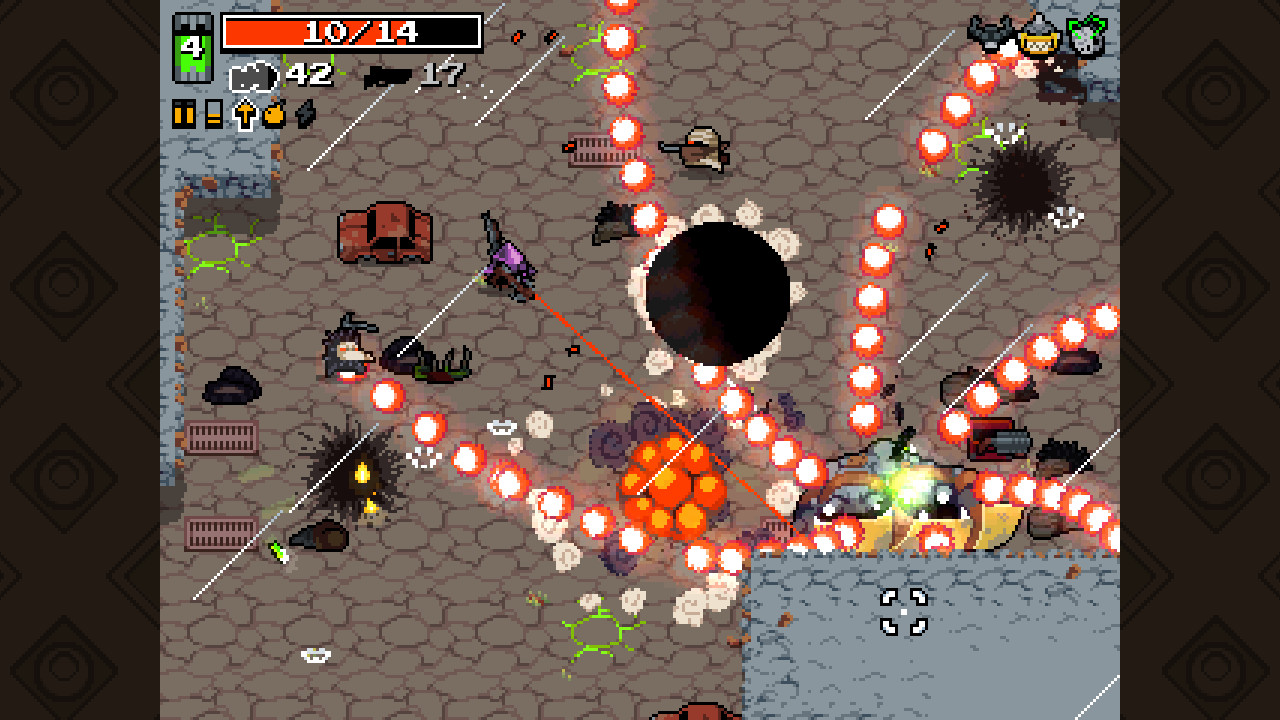
Nuclear Throne
Nuclear Throne left Early Access in the final month of 2015 without fanfare or publicity, the idea being, I suppose, that everyone who wants to play it has played it by now. There is the strange sense that since the game is done now, it’s also over – part of the joy of playing it has been to watch it evolve, with all the gains and losses that implies, feeling a kind of nostalgia as placeholder art and sound was replaced with more professional and yet perhaps less personal iconography. Yet I think we do the game a disservice if we don’t recognize what a coup it is, now that it’s all grown up.
Nuclear Throne is an immensely satisfying experience, full of little touches – screenshake, recoil, and the damp squish of victory – that make every firefight tactile and immediate. Beyond that, though, it’s an example of the very best kind of worldbuilding. Nuclear Throne’s post-apocalypse and its cast of characters feel considered and well-rounded, but only little bits of their substance actually make it onto the screen, because this is very definitely a game about shooting people and not about storytelling.
The backstory oozes through in snatches of flavor text, leaving the impression of something complex and important that you’re too busy getting shot at to fully absorb. It makes a little game seem big. The ultimate triumph of Nuclear Throne is that it absorbs the player completely – there’s no cutscenes, no waiting between death and restart, no break in the overpowering sonic environment of the battlefield. This locks the lizard part of the brain into fight-or-flight immediacy, and leaves the rest free to wander through the fallen world, wondering how everything went to shit so quickly.
Isaac Hoffer can be found on the internet. Things he does include the existential Let’s Play series Despair Mode and falling-asleep-in-the-back-of-your-parents’-car sim Talk Simulator 2.
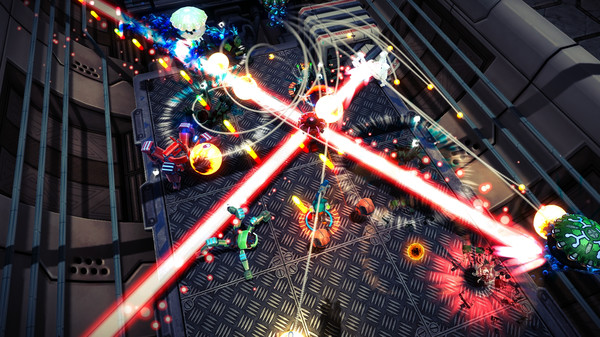
Assault Android Cactus
I’ve long been a fan of Saturday morning cartoons, even now that cartoons play around the clock, and the idea of a long Saturday morning full of cereal-flavored sugar in front of a television screen is gone. There’s something about the unapologetic energy and happiness to those proceedings that adult life doesn’t have as much of anymore, and there’s something lost there.
Assault Android Cactus manages to touch on the all the right elements of those sugar-fueled mornings, full of high energy and playfulness, while still being an excellently crafted shooter. Built out of the narrative parts of a 90s era arcade adventure, and the frenetic energy of a modern arena shooter, there’s an uncompromising devotion to the festive vibrance of a child at play.
Accompanying that energy is a beautiful aesthetic, wonderful soundtrack, excellent stage and enemy design, and an unapologetically fun game. Assault Android Cactus distills the unbridled fun that comes with games, and does so in a package that is unerring in its devotion to good polish, without ever trying too hard to do so.
It’s hard not fall in love with that energy, that playfulness, and go back to a time of childhood with too much sugar, too much drive, and the desire to keep having ridiculous amounts of fun.
Taylor Hidalgo is a writer, editor, and Features Editor for Haywire. He’s a fan of the sound of language, the sounds of games, and the sound of deadlines looming nearby. He sometimes says things on Twitter and his website, and has a Patreon if that’s your thing.
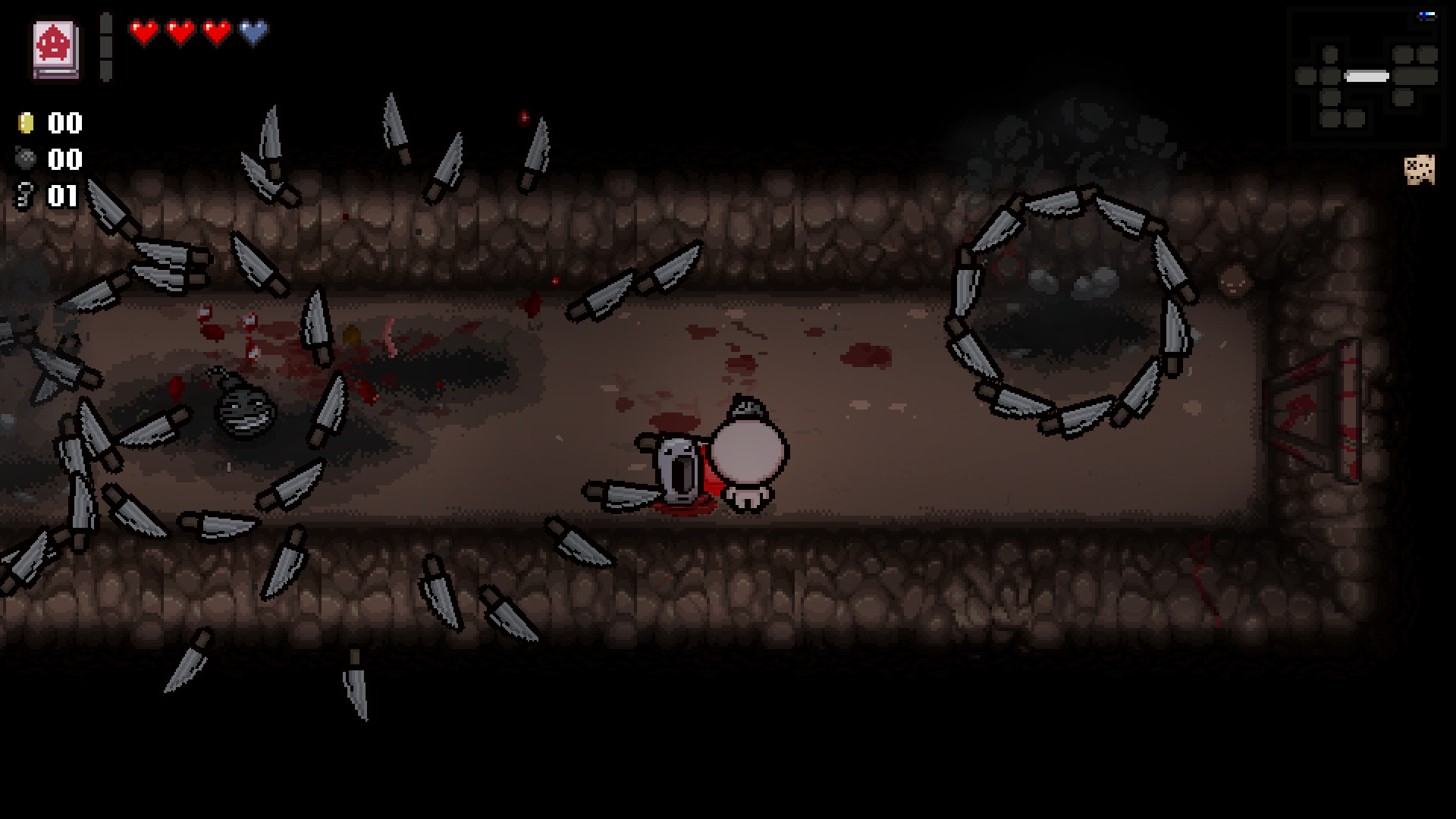
The Binding of Isaac: Afterbirth
In a sense, the Afterbirth expansion doesn’t change The Binding of Isaac a whole lot. Sure, it adds plenty of new items, new enemies, and new areas, but the core of the game largely remains untouched. It sports the same puerile aesthetic, the same fascinating process of combining reactive upgrades, the same wildly fluctuating difficulty curves – everything I wrote about last year, in short.
However, for a game that thrives on mystery – the excitement of picking up a new item and not knowing how it will transform you – the mere thought of new unknowns is enough to restore the thrills it once held, whether you actually run into any of the added content or not. Last time, it only took the community a few days to unlock the game’s best kept secrets, but this time Edmund McMillen, who did not enjoy their obsessive datamining, came back with a vengeance. Some of the additional content was only patched into the game once the community completed a complicated ARG.
Good thing it took them awhile. As soon as the mystery was solved, I lost interest in the game again and stopped playing.
Joe Köller founded Haywire, does German correspondence for Critical Distance, and occasionally writes for German sites such as Video Game Tourism, Superlevel, and WASD. You can follow him on Twitter, and support him on Patreon.